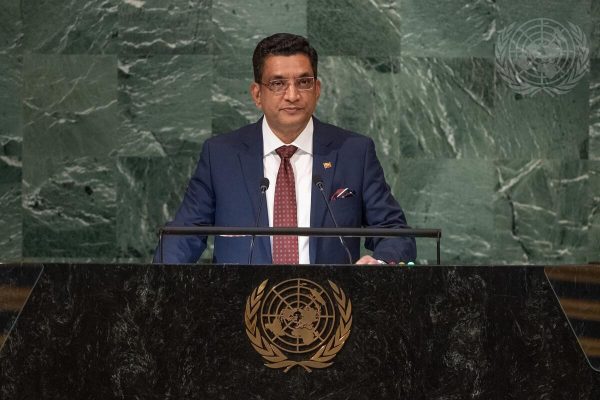Ahead of the vote on the new UN resolution on Sri Lanka, Foreign Minister Ali Sabry says it is difficult to compete with powerful nations in the UN Human Rights Council (UNHRC).
However, whatever the vote result Sri Lanka will stand firm against the new UNHRC resolution, he said speaking to the media from Geneva.
The final draft of the new resolution on Sri Lanka was submitted to the 51st UNHRC session in Geneva today (05) along with the UN Human Rights High Commissioner’s report on the human rights situation in Sri Lanka.
The draft resolution, titled ‘Promoting reconciliation, accountability and human rights in Sri Lanka’ was initially sponsored by the Core Group on Sri Lanka including the UK, US, Germany, Canada, Malawi, Montenegro and North Macedonia.
It has now been signed also by Albania, Australia, Austria, Belgium, Canada, Czechia, Denmark, Estonia, Finland, France, Germany, Iceland, Ireland, Latvia, Liechtenstein, Lithuania, Luxembourg, Marshall Islands, the Netherlands, New Zealand, Norway, Slovakia and Sweden.
The resolution, Promoting reconciliation, accountability and human rights in Sri Lanka, will be voted this week at the UN Human Rights Council in Geneva.
The draft requests the Office of the High Commissioner for Human Rights to enhance its monitoring and reporting on the situation of human rights in Sri Lanka, including on progress in reconciliation and accountability and on the human rights impact of the economic crisis and corruption.
The office has also been requested to present oral updates to the Human Rights Council at its 53rd session and 55th sessions and a written update at its 54th session and a comprehensive report that includes further options for advancing accountability at its 57th session in 2024.
The new resolution also expresses concern over the human rights developments since April 2022 including violence against and arrests of peaceful protesters as well as violence against government supporters, resulting in deaths, injuries, destruction and damage to houses of MPs.
The resolution has also sought to extend and reinforce the capacity of the Office of the High Commissioner to collect, consolidate, analyse and preserve information and evidence and to develop possible strategies for future accountability processes for gross violations of human rights or serious violations in Sri Lanka.
On October 6, there will be a vote in the UN Human Rights Council (UNHRC) on the resolution on the human rights situation in Sri Lanka. However, Sri Lanka is expected to lose the vote as it did in March 2021.


